| Posted: Feb. 05 2010,10:03 |
If you wrote this report, you will find a button here that you may click
in order to make changes in the report. 
|
Postal address of organization/institution
|
Laan van Meerdervoort 70, 2517 AN, The Hague, The Netherlands
|
E-mail address of organization/institution
|
info@unoy.org
|
Website address of organization/institution
|
www.unoy.org
|
Telephone of organization/institution
|
+31 (0)70 364 7799
|
PRIORITIES: All of the organization's domains of culture of peace activity |
EDUCATION FOR PEACE
HUMAN RIGHTS
WOMEN'S EQUALITY
DEMOCRATIC PARTICIPATION
UNDERSTANDING, TOLERANCE AND SOLIDARITY
INTERNATIONAL PEACE AND SECURITY
|
TOP PRIORITY: The organization's most important culture of peace activity |
EDUCATION FOR PEACE
|
PARTNERSHIPS AND NETWORKS: What
partnerships and networks does your organization participate in, thus
strengthening the global movement for a culture of peace? |
- Euros voor Vrede
- Platform Vredescultuur
- Earth Charter
- One World
- People Buiding Peace Netherlands Neetwork.
- Taking it Global/ Global Youth Action Network
|
ACTIONS: What activities have
been undertaken by your organization to promote a culture of peace and
nonviolence during the ten years of the Decade? If you already made a
report in 2005, your information from 2005 will be included in the 2010
report.
|
International Day of Peace
Every
year during the second half of the Decade for a Culture of Peace, UNOY
Peacebuilders and its members have celebrated the international day of
peace. Amongst the activities organised by UNOY Peacebuilders
includes a music festival and a debate for young people in The Hague,
attendance during a peace festival, launching of the international
campaign on Violence against Children and Youth, painting of large
collective peace paintings in front of the Peace Palace and collection
of ‘messages of peace’ on the beach of The Hague. The International Day
of Peace has been an occasion to celebrate the efforts done so far as
well as to raise the awareness on the issue amongst the general public.
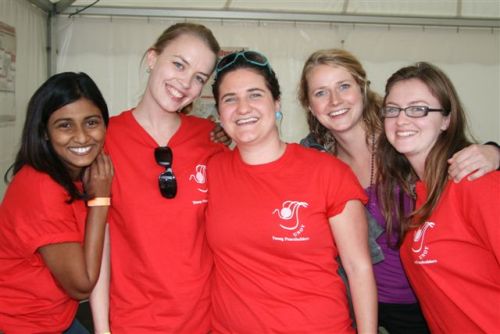
UNOY International Day of Peace 2009
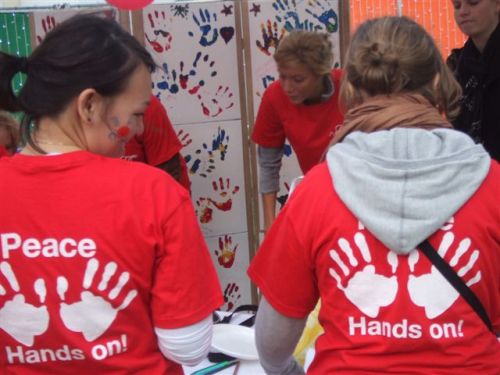
UNOY International Day of Peace 2007
Advocacy for a Culture of Peace
UNOY
Peacebuilders has done extensive advocacy for a Culture of Peace
together with its partners and members on local, regional and
international level.
UNOY Youth Advocacy Team for a Culture of
Peace: In October 2005, seven dedicated young people spent two weeks at
the United Nations in New York to promote the World Civil Society
Midterm Report on the Decade for a Culture of Peace and to lobby
countries to support the Culture of Peace resolution. The Team
delivered the Civil Society Report directly to 48 country missions and
contacted an additional 69. They convicted many people about the
importance of a global Culture of Peace and received much support from
the co-sponsoring countries. The role of the Youth Advocacy Team and of
youth in general, was specifically commended. In the General Assembly
plenary debate on 20 October 2005, dedicated to the “International
Decade for a Culture of Peace and Non-Violence for the Children of the
World”, the British delegate Adam Thomson speaking on behalf of the 25
member countries of the European Union stated: “The European Union pays
particular tribute to The United Network of Young Peacebuilders, a
global network of young people and youth organisations active in the
field of peace building. Their work is an example to us all, and
evidence of the significant role that civil society can play in
advancing a culture of peace”.
Following the advocacy efforts of
2005, and in partnership with Fundacion Cultura de Paz, the Youth
Advocacy Team returned to New York for the 61st Session of the General
Assembly, to lobby the General Assembly and the Permanent
Representative to the United Nations for increased commitment to
International Decade for the Culture of Peace and Non-violence, and the
strengthening of the implementation of the Programme of Action for the
Decade.
Survey on the creation of a Youth Solidarity Fund for a Culture of Peace
A
team of 16 people, including 7 from the UNOY Peacebuilders, worked on
the survey commissioned by Dr. David Adams, Fundacion Cultura de Paz,
and in collaboration with Bibliotecha Alexandrina (Egypt) and other
youth organisations. In less than two months, the team interviewed and
received answers from 460 youth organisations in 140 countries. Support
for the creation of a fund to support youth and culture of peace
projects was started. The Youth Solidarity Fund was announced at the
Alliance of Civilizations Forum in Madrid in January 2008 and six
months later, 7 youth-led projects were chosen for the pilot-phase of
this fund.
In addition to youth advocacy team at the United
Nations, the European Youth Advocacy team met with the European
Commissioner of Education, Training, Culture and Youth, Ján Figel to
discuss the important role of youth peace organisations in Brussels in
2007. UNOY Peacebuilders has also met with members of parliaments and
ministers in the Netherlands to advocate for campaigns for a Culture of
Peace as well as to promote the involvement of youth in peacebuilding
processes. UNOY Peacebuilders has also been represented during local
and international conferences and events, speaking up on the role of
youth and the positive impact young people can have towards
helping achieve a culture of peace.
Youth Advocacy for a Culture of Peace: A Reflective Guide for Action in Europe
In
addition to doing advocacy for a Culture of Peace, UNOY Peacebuilders
also felt the need to document some of the efforts done as well as to
motivate and train other young peacebuilders to engage in campaigning
and advocacy. ‘Youth Advocacy for a Culture of Peace: A Reflective
Guide for Action in Europe’ is a tribute to the role of youth in peace
advocacy. It is about youth coming together and helping each other to
understand how to carry out efforts towards achieving a culture of
peace. It is a space for youth to share their advocacy experiences with
other youth in order to give them the encouragement and guidance to
push for their cause not just to the wider public, but to policy-makers
as well. Where youth have participated in advocacy campaigns, this
tool-guide is a way to sustain those efforts and to keep youth
empowered.
The publication was written based on the critical
reflections of the Youth Advocacy Teams of UNOY Peacebuilders in 2005,
2006 and 2007. In addition to UNOY Peacebuilders, youth and youth
organisations shared their advocacy experiences. The organisations
involved include U Move 4 Peace (Belgium), the Helsinki Citizen’s
Assembly - Vanadzor (Armenia), YERITAC (Armenia), the Hague Appeal for
Peace (NY, USA), the Human Rights Information & Documentation
Centre (Georgia).
In ‘Youth Advocacy for a Culture of Peace: A
Reflective Guide for Action in Europe’, five youth advocates share
their experiences and inside tips. In addition, a number of other youth
who have been involved in peacebuilding advocacy have provided input.
Based on this, an extensive tool-guide was developed, which includes
practical tips, examples and exercises. Basic concepts such as
advocacy, peace and the role of youth are also explained. The
tool-guide motivates youth to take action in the context of the
International Decade for the Culture of Peace and the All-Equal
All-Different Campaign.
Capacity building
Training seminars
are one of UNOY Peacebuilders’ main activities as a way to build up the
skills of young peacebuilders and as a space for exchange of
experiences, networking, dialogue and building bonds of friendship and
solidarity among young people from different backgrounds. Activities
combine methodologies developed by non-formal education in youth work,
peace education, community development and intercultural learning.
Trainings organised by UNOY Peacebuilders have a participatory approach
based on the experience and opinions of participants. The methods
consist of a combination of presentations (using audio-visual
materials), group work, on-line forums, simulation exercises and role
plays (experiential learning), visits to organizations, specific
actions and individual reflection. All trainings organised by UNOY
Peacebuilders includes an introduction to the concept of a Culture of
Peace. The various trainings organised include Building Peace Skills
trainings in Crimea and Netherlands, African Youth in Motion for Peace
Training in Nairobi, Study Session on Applicability of Peacebuilding in
Youth Work, Hungary as well as an annual Summer School on Education for
Peace and Human Rights organised with the University of Utrecht.
Internships and peacebuilding trainings for young people
Throughout
the last decade, UNOY Peacebuilders has offered internship
opportunities to young peacebuilders. These internships provides an
opportunity for young people to learn more about concepts linked to
Culture of Peace as well as getting practical work experience. Young
people from a wide range of countries, disciplines and backgrounds have
completed internships and afterwards decided to pursue careers in
international peace work and peace education. During these internships,
UNOY Peacebuilders provide internal trainings on peace concepts,
project management, gender etc.
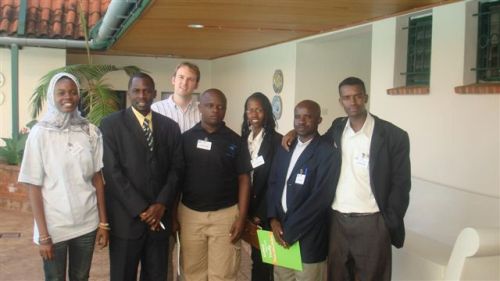
UNOY Advocacy Team in Nairobi, Kenya, 2009
Gender programme
The
United Network of Young Peacebuilders has been working on gender issues
for a number of years. Gender equality between men and women is at the
core of obtaining an inclusive and peaceful society. However, the
concrete idea for a UNOY Peacebuilders’ Gender Programme was first
initiated after several of UNOY Peacebuilders members indicated a
desire to implement gender mainstreaming in their work and in the UNOY
network. UNOY Peacebuilders took up this challenge, and in 2008 the
first activities were planned. Since then, UNOY Peacebuilders has
organised a number of trainings, established a gender working group,
developed a resource centre on gender and organised a study session on
Gender Equality in Youth Peacebuilding Projects in Budapest, Hungary.
Partners for Peace Publication
Several
youth peace organisations organise projects to promote a Culture of
Peace in partnerships. In order to make the projects even more
successful, UNOY Peacebuilders and a few member organisations wrote the
publication ‘Partners for Peace - A Toolkit for Setting Up European
Youth Peace Projects in Partnership’. The toolkit is the result of a
partnership between four youth peace organisations based in Europe.
This toolkit aims to identify effective ways of dividing,
decentralising and delegating tasks when setting up a youth peace
meeting between different international partners. This toolkit intends
to outline the possible problems and challenges frequently associated
with international projects that involve cooperation by a number of
partners. It also provides an overview on methods and tools, and
provides hands-on solutions to these problems.
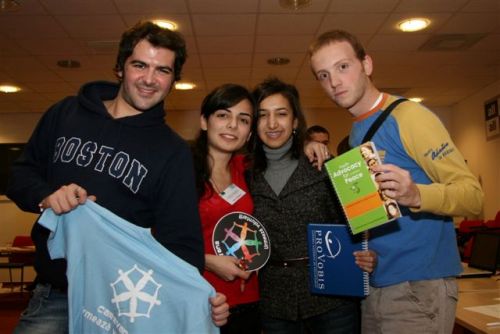 \ \
UNOY Gender Study Session 2009
Promoting a culture of non-violence with Arun Gandhi, grandson of Mahatma Gandhi
On
the 22nd of May 2009, the grandson of late Mahatma Gandhi, participated
in a joint event organised by UNOY Peacebuilders and three other youth
Peace and Human Rights organisations based in The Hague. The partner
organisations were the Unrepresented Nations and Peoples Organization
(UNPO), the Global Human rights Defense (GHRD) and Culture Clash 4 You
(CC4U). The event included
a solemn opening which was marked with
speeches and a ceremonial laying of flowers at the Statue of Mahatma
Gandhi. The events at the Gandhi statue provided the correct atmosphere
for a peaceful march into the town centre, to the venue, the Nutshuis.
At the Nutshuis about 100 young people from all nationalities and
cultural background gathered. After a short opening speech and play
about the life of Mahatma Gandhi, the floor was given to Arun Gandhi.
From
the very beginning, participants expressed their enthusiasm for a
speech by Mr. Arun Gandhi. The theme of the discussion was “Promoting a
Culture of Non-Violence among Youth.” Mr. Gandhi started the session by
giving a small demonstration, where he asked everyone to pair up and
have one person make a fist while the other person attempted to pry it
open. This was meant to show how violent people are, as the easiest
thing would have been to ask the other person to open their fist,
rather than use force to do it. He then explained how ‘culture of
violence’ is embedded in human nature. He posed significant question:
why our actions, traits, attitudes and general functioning are so
connected to violence, and whether this link is innate? In answering
the question, he contemplated two options ‘either to give up violence,
or to give up peace’. He explained further ‘nonviolence’ is a positive
step towards a constructive peace. This was eloquently demonstrated by
showing a link between love and nonviolence. As such a link has the
potential to lead to a more positive attitude. He then explained
positive attitudes help people make better choices in their lives. Mr.
Gandhi emphasized this point by referring to a saying of his
grandfather; “life is not about going in a circle but it is about
climbing up the ladder”. He pleaded for people to be better human
beings, and reminded “civilization does not mean living in a rich
country; civilization is not only your relationship with your brothers
and sisters; but with all of humanity.”
Mr. Gandhi’s discussion
revolved mainly around the role of young people in combating the
current culture of violence. And on several points he insisted we must
give up facile labels based on categorisation. Instead focus on the
label of human being alone and respect one another and placed a lot of
emphasis to the word “respect”. He contended that he does not like the
word “tolerance” as tolerance involves certain attitudes of resistance
and grudging acceptance of something existent, without any true embrace
of the thing itself. Drawing from an encounter with his grandfather,
Mr. Gandhi told a story about losing a ‘small pencil’, which
illustrated how even small, unconscious acts perpetuate violence both
against nature and against humanity. In the speech it was noted that we
all are contributors to violence in one way or another. We perpetrate
violence consciously or unconsciously by contributing and participating
in its genealogy. He made a distinction between two types of violence:
‘physical violence’ where force is applied and is put into forms of
war, rape, plunder; etc...; ‘passive violence’ where no force is
applied, it is merely perpetuated through existing exploitative
economic and/or political relationships. Mr. Gandhi concluded his
speech by linking up physical and passive violence, where he suggested
that a complex understanding of both types of violence is fundamental
to the pursuit of peace. In doing so, however, he noted it is important
to ask the essential question: to what extent are we passively violent?
Any peace must come from within us, arrived at by introspection.
Finally, Mr. Gandhi noted young people should be more loving and
responsible in order to transform the world for good, and achieve peace.
African Students Conferece
The
annual African Students Conference (ASC) in The Hague has been
organised by UNOY Peacebuilders and The African Committee since 2002,
and is one of the highlights on the UNOY calendar.
These ‘Building
Peace in Africa’ conferences deal with critical issues of major concern
in the field of advancing peace, justice and democracy. They aim to
raise awareness and to promote interdisciplinary dialogue, research and
action, stressing the role of culture, youth and civil societies.
About 250 participants come together and create bonds of
friendship and stimulate networking during the one-day conference.
Students are encouraged to bridge the gap between their studies,
to work together to build peace in Africa and to link up with the
Diaspora youth in the Netherlands.
These conferences draw
experienced speakers, many of whom are from Africa. Afternoon workshops
are normally followed by a reception offered by the Municipality of The
Hague, the International City of Peace and Justice, in order to give
the participants the opportunity to get further acquainted, to network
and to have fun.
The African Committee (TAC) is an
association of African students studying in various institutes of
higher education in the Netherlands. Its main objective is to meet
regularly and highlight factual issues affecting the continent of
Africa. The last few years, the conference themes have included
topics such as the impact of religion, post-conflict reconstruction and
reconciliation, urbanisation and human security and the role of
communication in conflict transformation.
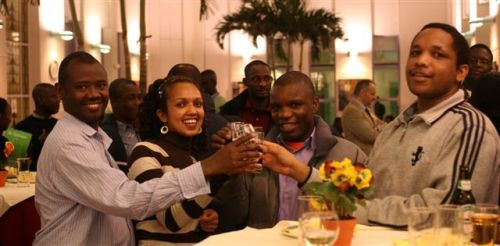
UNOY African Students Conference 2008
|
PROGRESS: Has your organization
seen progress toward a culture of peace and nonviolence in your domain
of action and in your constituency during the second half of the
Decade? |
UNOY
has seen that people have broadened their interest again to issues of
Peace and development. Some have however lost belief in development aid
as it was organised and the concept of non violence. Security concerns
also play among youth and debates about the value of military peace
forces is heavily debated, but no clear stance can be defined. Local
violence in communities is identified by young people not as a style of
living or a necessary evil but as a consequence of the lack of income
and exclusion young people suffer in their societies.
|
OBSTACLES: Has your organization faced any obstacles to implementing the culture of peace and nonviolence? If so, what were they?
|
-
A recurring challenge for youth peace organisations like UNOY
Peacebuilders is obtaining funding for the various projects. This is
relates also the fact that funders cause to support existing,
traditional, bigger organisations and not new youth organisations.
Trust and credibility is a challenge for youth organisation to obtain
with others. The negative image around youth effect them also when
raising funds.
- The concept of a Culture of Peace is still an
unknown concept amongst the general public, specially in Europe. For
instance, more people know about the Millennium Development Goals and
their measurable and time-specific goals.
- Unfortunately, a Culture of Violence is still predominant in many places.
|
PLANS: What new engagements are
planned by your organization in the short, medium and long term to
promote a culture of peace and nonviolence? |
- Continued networking amongst young peacebuilders
- Advocacy toolkit for an African audience
- Peace Education Summer schools
- International Internships for young peacebuilders to build their capacities
- Gender training to promote equality between women and men
|
GLOBAL MOVEMENT: How do you think the culture of peace and nonviolence could be strengthened and supported at the world level??
|
- Better coordination amongst organisations
- Conferences and opportunities to meet face-to-face
|
| Back to top |
|
|






 \
\